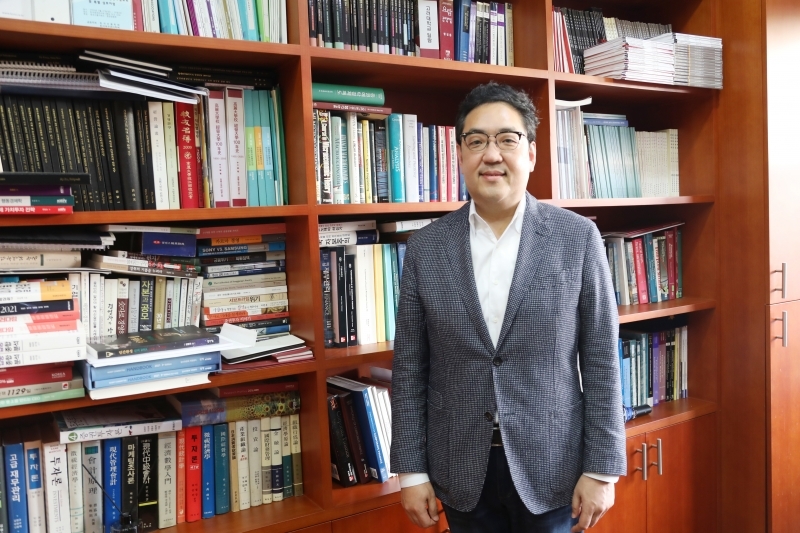News
KUBS News
“We will continue to support all members of KUBS to promote the research environment."
2022.12.26 Views 2502 국제실
[Interview with the Institute for Business Research and Education]
“We will continue to support all members of KUBS to promote the research environment."

Professor Kim Joonghyuk took office as the 34th president of the Institute for Business Research and Education in last September. The
1. Congratulations on the inauguration of the 34th President of the Institute for Business Research and Education. Please tell us how you feel.
The Institute for Business Research and Education (hereinafter referred to as IBRE) was established in 1958, and this year alone has been 64 years. Knowing the great status of IBRE at the time when I was attending KUBS, it is very meaningful and an honor for me to be the president of IBRE. However, on the other hand, as the history is long, it is true that the responsibility and burden come to a great extent. I think I spent time constantly thinking about the status and projects of IBRE because I thought I shouldn’t stop at the given task.
2. The Institute for Business Research and Education, founded in 1958, can be said to be the beginning of the Korean Business Management Research Institute. I think the role of corporate management researchers in the past and present may have changed a lot. What has changed in status and role so far?
In the mid-to-late 1980s, there were many doctor-level researchers belonging to IBRE, and their status and social contributions were significant enough to receive exemption from military service. When there was no consulting firm in Korea, a lot of corporate consulting was conducted through IBRE, which was the first management research institute in Korea. IBRE was also in charge of the electricity bill calculation project of the Korea Electric Power Corporation. There was a great influence not only in terms of the size of the institution but also in terms of its role, and beyond research, various activities were conducted in practical terms through frequent interactions with companies. But now, IBRE is focused on research naturally according to the trend, so it usually focusses on academic research support. Compared to its past status and scale, it has been considerably reduced and has many limitations, but we should try to secure its status through practical research support or educational programs.
3. If you have any goals or major tasks you are planning during your tenure in the philosophy of operation of the Institute for Business Research and Education, please tell us.
First of all, I would like to continue 'Brownbag Seminar' and 'Joint Data Construction Support for KUBS Collaborative Research' among the recent business contents.
First of all, the Brownbag Seminar was designed to meet the need for interdisciplinary research rather than independent research by detailed major within the business administration. As the corporate environment rapidly changes, there was a need for researchers to expand rather than be limited to specific areas, and we decided to hold a Brownbag seminar to create this atmosphere within KUBS. Twice a month, we have a session to present the research of the faculty regardless of the major. From the presentation of very light ideas to the in-depth content of which analysis has been completed, seminars including everything will be held regardless of the completeness. Open to all majors, you can share what research you do in other majors or what theories or phenomena are highly related to your research topic, and it provides time to look at them from various angles. About 20 faculty members participates each time these days, and it is now quite active and should continue. Another project that supports interdisciplinary collaboration and research is 'Joint Data Construction Support for KUBS Collaborative Research.' We provide support for when a researcher wants to build data in various major fields, not just in specific major fields. During my term of office, I will try to revitalize these two projects further.
In addition, we would like to expand the scope of future projects to research support including graduate students and undergraduates as well as teachers. Outstanding universities abroad also have many opportunities for undergraduate students to research, and during the vacation, they often hold various promotions related to research, such as providing programs for students to assist professors in research. As a result, naturally, students hold high value for research, and students are interested in "going to graduate school" as well as getting a job unconditionally after graduation. I am also thinking about how to provide research opportunities to undergraduates as the President of IBRE.
And as we've been in the midst of a major shift in the Fourth Industrial Revolution for years, there's a lot of need for data analytics. It will be able to expand into multiple businesses in collaboration with CDTB in the business. In addition, we are considering support measures to share and collaborate with various centers such as the KUBS ESG Research Center.
4. In the post-COVID-19 era, what direction do you think the Institute for Business Research and Education should move in?
It is true that COVID-19 had a great impact on society, economy, and culture, but I don't think it was enough to change the role or direction of IBRE. Through the COVID-19 situation, the conservative and difficult-to-change "university system" has been forced to change due to external shocks. There have been many changes, such as non-face-to-face classes and video conferences, and IBRE has been able to use them well to accelerate the progress of the project. In the case of the Brownbag Seminar I mentioned earlier, the participation rate have increased by conducting it online. If universities actively utilize the changes that they were forced to accept in the COVID-19 era, I think it will play a positive role in expanding the role of the foundation.


